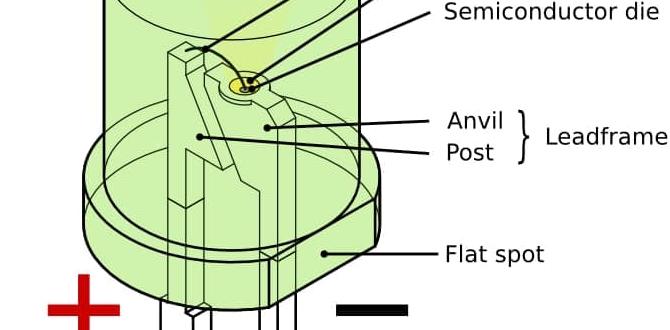Have you ever wondered how your body makes urine? It’s a fascinating process! Most people don’t think about it. But every time you go to the bathroom, your body has worked hard to create that urine.
Imagine this: your kidneys are like tiny factories. They filter your blood and remove waste. This waste then turns into urine. Isn’t that cool?
Many don’t know that urine also helps keep your body balanced. It removes extra water and some salts. By understanding how urine forms, you can learn more about how your body stays healthy.
Let’s dive deeper into this amazing process. You might be surprised by all the steps involved in how does urine form!
How Does Urine Form: Understanding Kidney Function And Urination

How Does Urine Form?
Urine forms through a fascinating process. First, the kidneys filter waste and extra water from the blood. This creates a liquid called urine. Did you know the average person makes about 1-2 liters of urine each day? It’s crucial for your body to remove toxins. Urine consists mainly of water, but it also contains salts and urea. Understanding how urine forms can help us appreciate our body’s amazing filtration system!The Filtration Process: Blood to Filtrate
How blood enters the kidneys and the role of the glomerulus. The process of filtration and what substances are filtered out.Blood enters the kidneys through small blood vessels. Once inside, it reaches the glomerulus. This tiny bundle of capillaries acts like a filter. The glomerulus separates important substances from waste. During filtration, water, salts, and waste products leave the blood. Valuable items like proteins and red blood cells stay in. This process creates a liquid called filtrate, which later becomes urine.
What substances are filtered out during this process?
- Water: Regulates fluid balance.
- Minerals: Adjusts salt levels.
- Urea: Removes waste from proteins.
- Excess vitamins: Keeps bodily functions in balance.
Did you know that kidneys filter blood around 50 times a day? This helps keep our bodies healthy!
Reabsorption: Recovering Essential Substances
Explanation of reabsorption in the renal tubules. Key nutrients and water that are reabsorbed back into the bloodstream.In the kidneys, urine goes through an important process called reabsorption. This happens in small tubes called renal tubules. Here, your body takes back key nutrients and water that it needs. By reabsorbing these substances, your body keeps itself healthy. Common nutrients that are reabsorbed include:
- Glucose
- Amino acids
- Salts
- Water
Without reabsorption, your body would lose important materials. It helps balance everything and keeps you feeling good.
What is reabsorption in the kidneys?
Reabsorption in the kidneys is the process where essential substances and water are taken back into the bloodstream from urine. This is crucial for maintaining the right balance of nutrients and hydration in your body.
Secretion: Eliminating Waste Products
The process of tubular secretion and its importance in urine formation. Common substances secreted into the urine.Our bodies are smart! They know how to get rid of stuff we don’t need. This happens through a process called tubular secretion. Tiny tubes in the kidneys help send waste products into the urine. It’s like taking out the trash but for your body! Common things that get disposed of include extra potassium and certain drugs. These substances leave the bloodstream and join the urine, ready for the big exit. It’s a clever way to keep you healthy!
| Substance | Why It’s Secreted |
|---|---|
| Potassium | To balance body fluids |
| H+ (Hydrogen ions) | To regulate pH levels |
| Medications | To clear drugs from the system |
The Role of Hormones in Urine Formation
How hormones like ADH and aldosterone regulate urine concentration. The impact of hydration and sodium levels on urine production.Hormones control how our bodies make urine. ADH, or antidiuretic hormone, helps the body hold onto water. When you’re thirsty, ADH levels rise. This makes urine less watery. Aldosterone helps keep sodium, which is key for hydration. High sodium means less water in urine. Here’s how they work:
- ADH increases water reabsorption.
- Aldosterone conserves sodium and water.
- Hydration affects urine concentration.
This process keeps our fluid balance right!
How do hormones affect urine concentration?
Hormones like ADH and aldosterone manage how much water and sodium our bodies use to control urine concentration. Their role is crucial when we’re dehydrated or have high sodium levels.
Urine Composition and Characteristics
Breakdown of common components found in urine. How urine color, odor, and clarity can indicate health.Urine is made up of many parts, and understanding them can be fun! The main components include water, urea, creatinine, and ions like sodium and potassium. Water is the superstar, making up about 95% of urine. The color can tell us a lot, too! A pale yellow means you are well-hydrated, while darker shades might signal dehydration. A funny smell? That could be your diet or certain medicines. Don’t worry, we all have our odd moments!
| Component | Percentage |
|---|---|
| Water | 95% |
| Urea | 2% |
| Creatinine | 0.1% |
| Ions (Sodium, Potassium) | Varies |
Remember, urine clarity can also indicate health. Sparkly urine may mean trouble, while clear urine usually shows you’re in the clear! Keeping track of these little signs can be a great way to stay healthy.
Factors Affecting Urine Formation
Lifestyle factors like diet, hydration, and exercise. Medical conditions that can influence urine production and composition.Many things can change how urine forms. Diet plays a big role. If you eat salty snacks, your body needs more water. Drinking enough fluids keeps things moving smoothly. Don’t forget about exercise! Sweating can cause your body to make less urine. Also, certain medical conditions can impact urine too. For example, diabetes can lead to more peeing, like a water fountain at a party! Check out the table below for more factors:
| Factor | Effect on Urine |
|---|---|
| Diet | Salty foods increase thirst |
| Hydration | More water means more urine |
| Exercise | Sweat reduces urine production |
| Medical Conditions | Diabetes increases urine output |
The Importance of Urine Analysis in Health Diagnostics
How urine tests can help diagnose various conditions. Common tests performed and what they reveal about health.Urine tests are very important for checking our health. These tests can discover different issues in the body. Doctors can use urine analysis to find conditions like diabetes or kidney disease. Here are some common tests and what they reveal:
- Physical examination: Checks color and clarity.
- Chemical tests: Analyzes pH and sugar levels.
- Microscopic examination: Looks for cells and crystals.
These tests give doctors useful information to help keep you healthy!
How can urine analysis help diagnose conditions?
The results from urine tests can help find specific health problems. For example, high sugar levels may indicate diabetes. Knowing this helps your doctor give the right treatment.
Conclusion
In summary, urine forms through three main processes: filtration, reabsorption, and secretion. First, kidneys filter blood to remove waste. Then, they take back essential nutrients. Finally, they add extra waste to urine. To learn more about how your body works, explore topics like the kidney’s role in health. Understanding this helps you appreciate your body’s amazing functions!FAQs
Sure! Here Are Five Related Questions About How Urine Forms:Urine forms when your body needs to get rid of extra things in the blood. First, your kidneys clean the blood. They take out waste and extra water. This waste and water mix together to make urine. Finally, urine is stored in your bladder until you go to the bathroom.
Sure! Just tell me what question you need help with. I’m here to help you!
What Are The Primary Processes Involved In Urine Formation In The Kidneys?To make urine, our kidneys use three main steps. First, they filter blood to remove waste and extra water. This is called filtration. Next, they help our body keep important stuff like water and nutrients through reabsorption. Finally, they push out what we don’t need as urine, which we then pee out.
How Do The Structures Of The Nephron Contribute To The Formation Of Urine?The nephron is like a tiny water filter in your kidneys. Each nephron has special parts that help it work. First, it filters out waste and extra water from your blood. Next, it reabsorbs things your body still needs, like water or salt. Finally, what’s left becomes urine, which your body gets rid of.
What Role Does Filtration Play In The Process Of Urine Formation?Filtration is the first step in making urine. It happens in the kidneys, where blood gets filtered. This means that good stuff, like water and nutrients, goes back into your body. Waste and extra stuff, like toxins, stay behind. These waste products then mix to form urine that leaves your body.
How Do Hormones Regulate The Formation Of Urine And Affect Fluid Balance In The Body?Hormones help our body control how much urine we make and keep our fluids balanced. When you drink a lot, a hormone called antidiuretic hormone (ADH) tells your kidneys to hold onto water. If you’re dehydrated, ADH helps you make less urine. Another hormone, aldosterone, tells your kidneys to keep sodium and water, which helps you not get too thirsty. Together, these hormones help you stay healthy and balanced!
What Factors Can Influence The Composition And Volume Of Urine Produced?Several things can change how much urine you make and what it contains. First, how much water you drink affects this a lot. If you drink more, you’ll make more urine. Also, what you eat can change your urine. Foods like asparagus can make it smell different. Finally, your health matters too. If you’re sick or on medicine, it might change your urine too.








